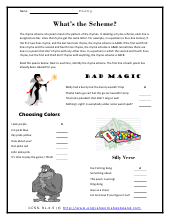Structural Elements Worksheets To Print:
What's the Scheme? – We look at various poems and determine the rhyme scheme.
Understanding Meter in Poetry – Give these lines of a poem feet.
Parts of a Poem – Time for you to critically breakdown a poem.
Types of Poetry – We go over all the main forms of poetry and work on style identification.
Fiction | Nonfiction – You take some short passages and quickly identify the selection format.
Identifying Genres – A genre is a group of books that all have something in common.
Why Did You Write That? – Most prose is meant to inform or explain, persuade, entertain, or describe something to its audience. Sometimes it can do a combination of these things.
Elements of Nonfiction – Read the passages and then on the next page, identify the lead, the main idea, the supporting details and the conclusion.
Drama - Can You Adapt this Story for the Stage? – Unlike poetry or prose (fiction and nonfiction) drama-which means plays and movies-are not really meant to be read.
The Language of Drama – Use the words in the box at the bottom of the page to fill in the blank for each sentence.
Comedy or Tragedy? – Read the brief descriptions of famous plays and see if you can identify whether they are comedies (C) or tragedies (T).
Narration in Drama – Read the partial script. Then fill in the missing lines for the chorus, providing information that will help the audience to better understand what is going on.
Forms of Drama – It's time for rehearsal! Read what's going on in each scene, and decide whether the actors are rehearsing a play, a skit, an opera, a musical or a monologue.
Identifying Poetry vs. Prose vs. Drama – Identify each item on the list below as characteristics of poetry, prose or drama. Write the correct answer on the line.
Poetry, Prose, Drama In Action – Each passage below has had its formatting removed. Judging just from the words, identify whether the passage is poetry, prose or drama, and why.
Get FREE English Worksheets In Your Email

